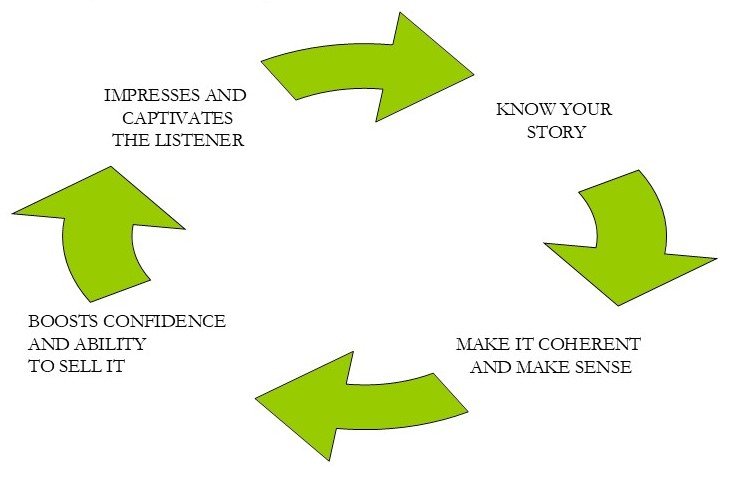Sharpen your career narrative
We’ve all heard the dreaded question: can you tell us a bit about yourself?
In today’s job climate, it’s important to establish a career narrative for yourself, just as much as prospective employers.
Knowing how to tell your story in a concise manner is crucial for selling yourself, but it’s also a chance to reflect on your own motivations, and look to the future.
Whether it’s for a career switch, or a move into a tough industry to crack, your career perception is important.
How to embrace a radical career change
This article will break down what your career narrative is, and give you some basic tools to sell yourself for the position you want.
What is a career narrative?
To put it plainly, a career narrative is a technique for telling the story of your professional experience in an interesting way.
It can feel like an awkward vanity slog to have to pull out the “Hey, I’m Jeremy, I like ceviche, long walks on the beach, and I’m super passionate about data analysis…” introduction for every job opportunity.
With a career narrative, you can weave the story into all outgoing personal statements and branding you make.
This narrative can be put forward to employers, networking opportunities, and for personal branding. It is a convincing strategy for selling an idea of yourself.
How to write a career narrative
Careers are rarely a straight line, but that doesn’t mean they can’t make logical sense. It’s important to understand how you can alter how your own resume can be perceived.
In her article (2001) My Brilliant Career, Laurie Cohen argues that stories are instruments to illuminate the ways individuals make sense of their careers.
Later in 2004, she explained that the career narrative goes hand in hand with the theory of social constructionism.
What she meant is if we accept that humans make our own social world, not that it is imposed on us, then the career is also constructed by the individual as we interact with others and move through time.
Know your audience
The key thing to constructing any career narrative is knowing how to grab a specific audience.
For employers, it could be previous roles or skills they are looking for. For networking, it could be shared interests. If you’re branding via social media, it could be even as simple as the posts you interact with, and the messages you choose to endorse!
Presenting yourself as one size fits all is unlikely to work out. Career narratives should be short, coherent and tailored.
How to be a brilliant career storyteller
However, here’s the good news: with each person, role or company you find research into for opportunities, you’ll find new ways to relate your own experience to theirs.
Down the line, you’ll find it easier to write about yourself, as you can pool from more and more examples.
Keep small written examples of how you relate to your chosen target, they can be really helpful, especially in interviews.
Read here: Interview tips from a professional career coach.
Key milestones
Once you know how your experience relates to your targeted area, you can begin to identify key milestones. This is the skeleton of your career narrative.
Simplify your career change with a transitionary role
Now it’s time to bring in examples from your career thus far. These can be anything noteworthy that is applicable to your story. Think about how each example can demonstrate a different element to your career narrative.
For example, if you were applying for a job in which you had to demonstrate a passion for creative design, you would show this through noting courses, certificates or examples of artists or pieces which inspired you to pursue it.
The trick is to show an active interest.
These moments help to streamline the process of selling yourself, too, and structure your narrative, whilst helping you to think about your career goals in the future.
Show your strengths
To reinforce your examples, you should identify your skills and strengths. This goes beyond what is learned. Often what shapes the careers we find ourselves in is our innate abilities.
Be more than your job title, and navigate your career with your transferable skills, instead.
This builds a more fleshed out view of yourself as a person. It also gives some much needed context to a person that a simple personal statement cannot.
Your career is beginning to make sense now! Hopefully by going through these stages, it is making more sense to you too.
Career narrative counselling
Career narrative counselling is a very common tool for career coaches. For example, an exercise that can be useful is referred to as construction, deconstruction, reconstruction.
This is the process of telling your story, unpacking it with the help of a careers coach, and then with their help, reauthoring it.
The process of reframing your narrative is helpful. Our lives are never simple, and that often goes for our careers too. Careers narrative counselling gives you the objectivity to send the right message.
What now?
Career narratives are as much for you as they are for selling yourself. You’ve essentially now given yourself the perfect elevator pitch that can captivate your audience. So try it out!
No matter what the line of work, our lives - more than ever - are intertwined with our careers. It can seem messy, incoherent, and confusing to present outwardly.
Using the career narrative technique, you’ll have a clearer direction and sense of self will make you feel more engaged and motivated to continue your own story.



